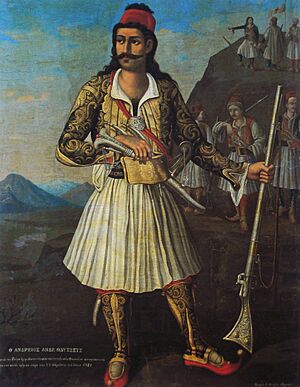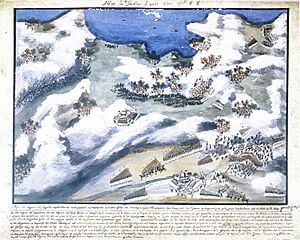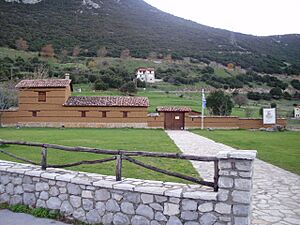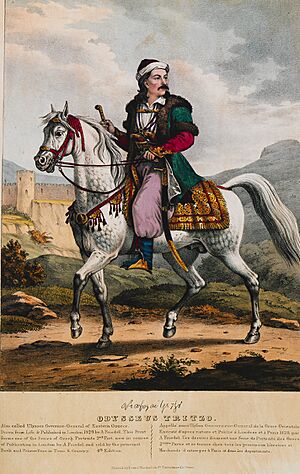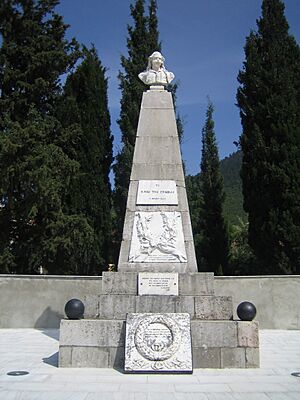Odysseas Androutsos facts for kids
Quick facts for kids
Odysseas Androutsos
|
|
|---|---|
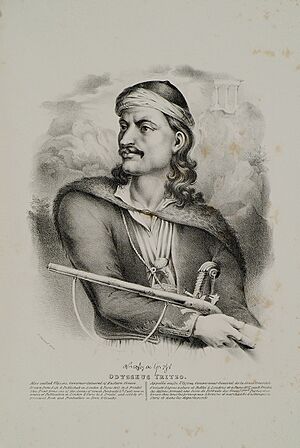
Portrait of Androutsos entitled Odysseus Tritzo (Adam Friedel, 1830).
|
|
| Native name |
Οδυσσέας Ανδρούτσος
|
| Birth name | Odysseas Verousis Οδυσσέας Βερούσης |
| Nickname(s) | Kapudan Disava |
| Born | c. 1788-1790 Ithaca or Preveza, Republic of Venice (now Greece) |
| Died | 5 June 1825 (aged 37) Frankish Tower, Athens, First Hellenic Republic |
| Buried | |
| Allegiance | |
| Service/ |
|
| Commands held | Commander-in-Chief of Central Greece |
| Battles/wars |
|
| Spouse(s) | Eleni Kareli |
| Children | Leonidas Androutsos |
| Relations | Andreas Verousis (father) Akrivi Tsarlampa (mother) Lambros Katsonis (godfather) |
| Other work | Member of the Filiki Etaireia |
Odysseas Androutsos (born Odysseas Verousis, around 1788-1790 – 1825) was a brave Greek military leader. He was an armatolos (a Greek soldier who protected areas for the Ottoman Empire) in eastern mainland Greece. He became a very important figure in the Greek War of Independence.
Androutsos was born in Ithaca. His father was a klepht (a Greek bandit who fought against Ottoman rule) and a privateer. His mother came from a wealthy family in Preveza. He grew up in the court of Ali Pasha, a powerful Ottoman Albanian ruler. Androutsos became one of Ali Pasha's commanders.
Later, he joined a secret Greek revolutionary group called Filiki Eteria. This group aimed to free Greece from Ottoman rule. When the Greek War of Independence began in 1821, Androutsos quickly joined. He became famous for his leadership in the Battle of Gravia Inn in May 1821. Because of this victory, he was made the military commander of eastern mainland Greece.
Androutsos sometimes made agreements with his enemies. This was a tactic to gain time or distract them. Because of this, some people in the Greek government accused him of being a traitor. However, many historians now see these actions as smart military moves. He was captured by revolutionary forces in 1825 and died shortly after. Today, he is remembered as one of Greece's most important heroes.
Contents
Early Life and Family
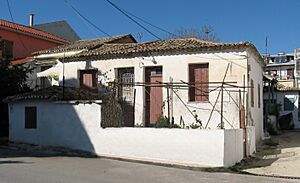
Odysseas Androutsos was born between 1788 and 1790. His father, Andreas Verousis, was a Greek fighter from Livanates. He was known for fighting against the Ottoman Empire. Odysseas's mother, Akrivi Tsarlampa, was from a well-known family in Preveza.
Odysseas never met his father, who died in an Ottoman prison in 1792. He was raised by his mother's family, who were wealthy and lived in the Ionian islands. These islands were ruled by European powers, so Odysseas grew up with new ideas about freedom and ancient Greece. His family later moved to Lefkada after Ali Pasha attacked Preveza in 1798.
Life with Ali Pasha
Around 1805 to 1810, Odysseas decided to become a soldier. He joined the army of Ali Pasha in Ioannina. Ali Pasha was a very powerful ruler. Odysseas quickly showed his military skills and became part of Ali Pasha's personal guard. He learned Italian and was influenced by Ali Pasha's strong leadership style.
In 1816, Ali Pasha made Androutsos the armatolos of Livadeia. This meant he was in charge of keeping order in that area. Odysseas brought security to the region and gained power. He also made sure to increase his own wealth. He married Eleni Kareli, the daughter of a powerful family.
In 1818 or 1820, Androutsos joined the Filiki Eteria. This was a secret society planning the Greek Revolution. When Ali Pasha fought against the Ottoman Sultan, Androutsos first supported Ali. But in late 1820, he left Ioannina and went to the Ionian islands. In January 1821, he met with other Greek leaders in Lefkada. They all agreed to join the upcoming Greek Revolution.
Role in the Greek Revolution
In March 1821, Androutsos went to western mainland Greece. He tried to unite local leaders against the Ottoman Sultan. In May 1821, a large Ottoman army led by Omer Vrioni moved south. They had already defeated Greek forces and killed another hero, Athanasios Diakos.
Androutsos, with about 100 men, took a strong defensive position at an inn near Gravia. Other Greek leaders, Panourgias and Diovouniotis, supported him. Vrioni's army attacked the inn but was pushed back with heavy losses. The Greeks managed to escape before more Ottoman soldiers arrived. Androutsos lost only six men. This battle made him famous, and he was named Commander in Chief of Greek forces in Central Greece.
Androutsos wanted to build his power in Attica and Euboea. In April 1822, he tried to stop another Ottoman army. His plan failed because the Greek government did not send him the supplies he needed. The government then tried to replace him. Androutsos had the two men sent to replace him killed. This caused problems with the government. He was accused of working with the Ottomans, but he was soon put back in command.
In September 1822, Androutsos, along with Yannis Gouras and Yannis Makriyannis, took control of the Acropolis in Athens. He became the general-in-chief of Attica. He also helped protect an ancient spring called Klepsydra on the Acropolis.
Androutsos sometimes made secret agreements with the Ottomans. He claimed these were tricks to give the Greek revolutionaries time to move people to safety. He also tried to trap Ottoman armies. These actions often helped the Greek cause by delaying enemy operations.
Capture and Death
In early 1825, the Greek government still wanted to remove Androutsos from command. In anger, he started talking with Omer Pasha, an Ottoman leader. He offered to hand over the Acropolis if Ottoman troops helped him control certain areas. He even joined the Ottoman army to defend villages near Livadia.
However, the promised Ottoman help did not arrive. Androutsos was captured by Greek revolutionary soldiers. The government accused him of working with the Ottomans. He was put in the Frankish Tower on the Acropolis of Athens. He was not given a trial.
Androutsos died on June 5, 1825. His body was thrown from the Acropolis and buried at its base. This act was ordered by Yannis Gouras, who had once been Androutsos's second-in-command.
Remembering Androutsos
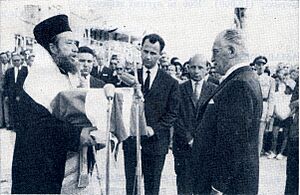
In 1865, Androutsos's body was found and given a proper funeral in Athens. He was buried in the First Cemetery of Athens. More than a century later, in 1967, his bones were moved to a special monument in the central square of Preveza.
Legacy and Impact
In Greece, Odysseas Androutsos is seen as a tragic hero. Some scholars consider him one of the most important military leaders of the Greek War of Independence. Others have debated whether his actions were always loyal to the Greek cause.
People who knew him had different opinions. Edward Trelawny, who married Androutsos's sister, saw him as a noble figure. Others described him as strong but sometimes harsh. His agreements with the Ottomans were often tactical. They gave the Greeks time to move people to safety or prepare for battles. For many fighters of that time, the idea of a single "Greek nation" was still new.
Androutsos also cared about education. He wrote to important Greek thinkers, asking them to teach children about Greek history and values. He even started schools and worked to protect ancient Greek artifacts. He is remembered as a symbol of Greek freedom.
In Arts and Sports
Many Greek poets have written poems about Androutsos. These include Kostis Palamas and Zacharias Papantoniou. He is also a main character in Nikos Engonopoulos's poem Bolivar, a Greek poem.
The first Greek movie about the War of Independence, Odysseas Androutsos (1928), was about him.
The soccer team in Gravia, Odysseas Androutsos F.C., is named after him. So is the cultural group in his family's village of Livanates.
See also
- Battle of Gravia Inn
Sources
 | William M. Jackson |
 | Juan E. Gilbert |
 | Neil deGrasse Tyson |


